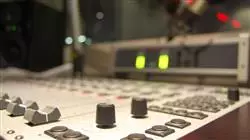University certificate
The world's largest faculty of journalism and communication”
Introduction to the Program
This program will allow you to enhance your skills and become a successful journalist in the radio world"

Radio is one of the sectors with more followers, given that it has been one of the most popular since its beginnings. Its immediacy and the possibility of enjoying it from anywhere have made the success of this format possible.
Likewise, being an immediate channel of communication, radio is used by many journalists worldwide. Being a sound format allows them to be effective and punctual with the different models of journalism offered. Throughout history, the most striking models within radio have been: newscasts, interviews, radio soap operas and informative talk shows, many of them starting from social, cultural, economic, sports and international events.
It must be taken into account that the transmission of information can be carried out through different media and, specifically, this Professional master’s degree aims to specialize students in Radio Journalism.
The syllabus covers everything from the theory of journalism to the writing process, a basic element in any journalistic format, or advertising. But it also covers two fundamental sectors in the world of radio: sports and cultural journalism. In addition, as it could not be any other way, a fundamental part of this Professional master’s degree is aimed at learning about the particularities of Radio Journalism and communication.
This program is the most complete qualification directed towards the professional in the field of journalism and communication to reach a higher level of performance, based on the fundamentals and the latest trends in radio. Take advantage of the opportunity and become a professional with solid fundamentals through this educational program and the latest educational technology 100% online.
Work with the best teaching professionals in this Professional master’s degree with excellent curricular value"
This Professional master’s degree in Radio Journalism contains the most complete and up-to-date educational program on the market. Its most notable features are:
- Practical cases presented by experts in Radio Journalism
- The graphic, schematic, and practical contents with which they are created provide scientific and practical information on the disciplines that are essential for professional practice
- Latest developments in Radio Journalism
- Practical exercises where the self-assessment process can be carried out to improve learning
- A special emphasis on innovative methodologies in the field of Radio Journalism
- Algorithm-based interactive learning system for decision-making in the situations that are presented to the student in radio
- Theoretical lessons, questions to the expert, debate forums on controversial topics, and individual reflection assignments
- Access to content from any fixed or portable device with an Internet connection
This Professional master’s degree is perfect for you to know how to tell the story you want to tell and do it in a professional way"
Its teaching staff includes professionals belonging to the world of journalism, who bring to this program the experience of their work, as well as recognized specialists from prestigious reference societies and universities.
The multimedia content, developed with the latest educational technology, will provide the professional with situated and contextual learning, i.e., a simulated environment that will provide an immersive program designed to learn in real situations.
This program is designed around Problem-Based Learning, whereby the professional must try to solve the different professional practice situations that arise throughout the program. To this end, the professional will be assisted by an innovative interactive video system developed by renowned and experienced experts in Radio Journalism.
Don't miss the opportunity to increase your skills in Radio Journalism”

Know the latest trends in Radio Journalism and be the best in this sector”
Why study at TECH?
TECH is the world’s largest online university. With an impressive catalog of more than 14,000 university programs available in 11 languages, it is positioned as a leader in employability, with a 99% job placement rate. In addition, it relies on an enormous faculty of more than 6,000 professors of the highest international renown.

Study at the world's largest online university and guarantee your professional success. The future starts at TECH”
The world’s best online university according to FORBES
The prestigious Forbes magazine, specialized in business and finance, has highlighted TECH as “the world's best online university” This is what they have recently stated in an article in their digital edition in which they echo the success story of this institution, “thanks to the academic offer it provides, the selection of its teaching staff, and an innovative learning method aimed at educating the professionals of the future”
A revolutionary study method, a cutting-edge faculty and a practical focus: the key to TECH's success.
The most complete study plans on the university scene
TECH offers the most complete study plans on the university scene, with syllabuses that cover fundamental concepts and, at the same time, the main scientific advances in their specific scientific areas. In addition, these programs are continuously being updated to guarantee students the academic vanguard and the most in-demand professional skills. In this way, the university's qualifications provide its graduates with a significant advantage to propel their careers to success.
TECH offers the most comprehensive and intensive study plans on the current university scene.
A world-class teaching staff
TECH's teaching staff is made up of more than 6,000 professors with the highest international recognition. Professors, researchers and top executives of multinational companies, including Isaiah Covington, performance coach of the Boston Celtics; Magda Romanska, principal investigator at Harvard MetaLAB; Ignacio Wistumba, chairman of the department of translational molecular pathology at MD Anderson Cancer Center; and D.W. Pine, creative director of TIME magazine, among others.
Internationally renowned experts, specialized in different branches of Health, Technology, Communication and Business, form part of the TECH faculty.
A unique learning method
TECH is the first university to use Relearning in all its programs. It is the best online learning methodology, accredited with international teaching quality certifications, provided by prestigious educational agencies. In addition, this disruptive educational model is complemented with the “Case Method”, thereby setting up a unique online teaching strategy. Innovative teaching resources are also implemented, including detailed videos, infographics and interactive summaries.
TECH combines Relearning and the Case Method in all its university programs to guarantee excellent theoretical and practical learning, studying whenever and wherever you want.
The world's largest online university
TECH is the world’s largest online university. We are the largest educational institution, with the best and widest online educational catalog, one hundred percent online and covering the vast majority of areas of knowledge. We offer a large selection of our own degrees and accredited online undergraduate and postgraduate degrees. In total, more than 14,000 university degrees, in eleven different languages, make us the largest educational largest in the world.
TECH has the world's most extensive catalog of academic and official programs, available in more than 11 languages.
Google Premier Partner
The American technology giant has awarded TECH the Google Google Premier Partner badge. This award, which is only available to 3% of the world's companies, highlights the efficient, flexible and tailored experience that this university provides to students. The recognition as a Google Premier Partner not only accredits the maximum rigor, performance and investment in TECH's digital infrastructures, but also places this university as one of the world's leading technology companies.
Google has positioned TECH in the top 3% of the world's most important technology companies by awarding it its Google Premier Partner badge.
The official online university of the NBA
TECH is the official online university of the NBA. Thanks to our agreement with the biggest league in basketball, we offer our students exclusive university programs, as well as a wide variety of educational resources focused on the business of the league and other areas of the sports industry. Each program is made up of a uniquely designed syllabus and features exceptional guest hosts: professionals with a distinguished sports background who will offer their expertise on the most relevant topics.
TECH has been selected by the NBA, the world's top basketball league, as its official online university.
The top-rated university by its students
Students have positioned TECH as the world's top-rated university on the main review websites, with a highest rating of 4.9 out of 5, obtained from more than 1,000 reviews. These results consolidate TECH as the benchmark university institution at an international level, reflecting the excellence and positive impact of its educational model.” reflecting the excellence and positive impact of its educational model.”
TECH is the world’s top-rated university by its students.
Leaders in employability
TECH has managed to become the leading university in employability. 99% of its students obtain jobs in the academic field they have studied, within one year of completing any of the university's programs. A similar number achieve immediate career enhancement. All this thanks to a study methodology that bases its effectiveness on the acquisition of practical skills, which are absolutely necessary for professional development.
99% of TECH graduates find a job within a year of completing their studies.
Professional Master's Degree in Radio Journalism
It was on October 30, 1938 when broadcaster and screenwriter Orson Welles (later a film director) aired a radio episode of "The War of the Worlds" based on the work of the same name by writer H.G. Wells. The narrative form that Welles used to tell the story was so innovative and convincing that an entire population believed that an extraterrestrial invasion was actually taking place, which led to mass panic and chaos. The curious misunderstanding went down in history as one of the most unforgettable lessons: the tremendous power of the media, including radio. The Professional Master's Degree in Radio Journalism offered by TECH Global University brings you closer to one of the informative and entertainment tools that continues to have a great boom despite the diversification of technological media. We will train you to reinforce and update some of the basic fundamentals of journalism in its broadest dimension, as well as audiovisual narrative and advertising theory. Once you have the solid foundations for the full development of the profession, we will teach you about radio communication in its most varied aspects, including cultural and sports journalism, which are in great demand in the market. Do you want to have a landmark moment through the microphone as Orson Welles did? With TECH you are about to achieve it.
Study and be part of the new radio revolution
Contrary to what most would think, digital media did not manage to undermine the power of radio, on the contrary, they renewed it. In countries like Spain, more than 25.5 million people listen to the radio every day according to a report by the Association for Media Research (AIMC). In other countries such as Peru, the number of daily radio listeners is 79.5% of the total population. The birth of podcasts also meant a reinvention of the radio model in the face of the expansion of the Internet: it increased by 40% in 2 years according to a study by the EncuestaPod portal carried out in 2021 and will continue to grow by 30% as a highly profitable market for the next five years, according to the consulting firm Deloitte. Through our Professional Master's Degree you will have the highest curricular skills to be part of this new radio wave. An innovative platform and a team of experts in the field are waiting for you to become the professional you dream of.







